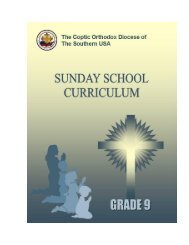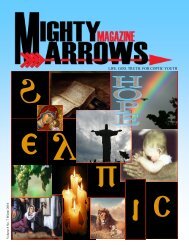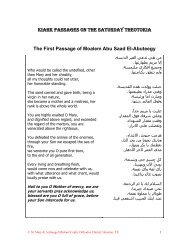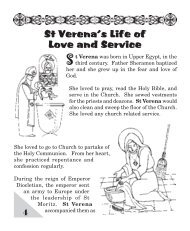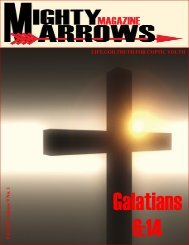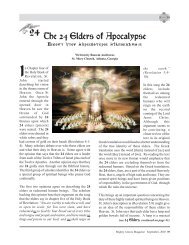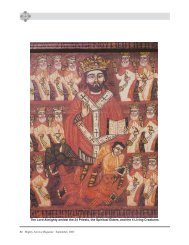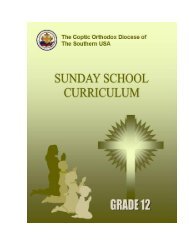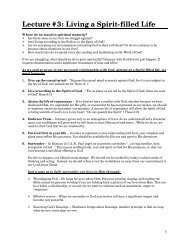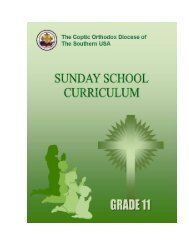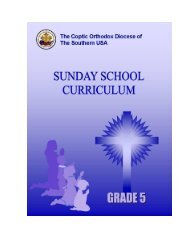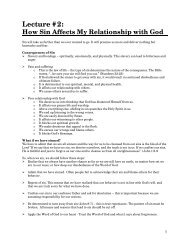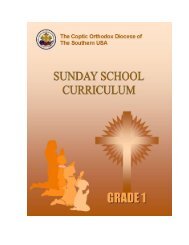Grade 10 - Coptic Orthodox Diocese of the Southern United States
Grade 10 - Coptic Orthodox Diocese of the Southern United States
Grade 10 - Coptic Orthodox Diocese of the Southern United States
Create successful ePaper yourself
Turn your PDF publications into a flip-book with our unique Google optimized e-Paper software.
Sunday School Curriculum <strong>Grade</strong> <strong>10</strong><br />
The Lord was powerful even when He was in <strong>the</strong> grave. Death could not have power over<br />
Christ‘s human soul that united with <strong>the</strong> Logos (<strong>the</strong> Word). Death could not enslave His soul<br />
nei<strong>the</strong>r corruption could humiliate Him.<br />
The Flesh <strong>of</strong> Resurrection<br />
When <strong>the</strong> Lord rose, He was not weak. He did not need anyone to untie Him <strong>of</strong> His clo<strong>the</strong>s as<br />
<strong>the</strong> case was with Lazarus, or eat to have power as <strong>the</strong> case was with Jairus‘ daughter.<br />
But He rose and <strong>the</strong> stone put where it was <strong>the</strong> clo<strong>the</strong>s were and <strong>the</strong> guards were standing.<br />
That who entered <strong>the</strong> room while <strong>the</strong> doors were closed, can go out while <strong>the</strong> stone blocked<br />
<strong>the</strong> grave.<br />
The Lord rose with <strong>the</strong> same body he took from <strong>the</strong> Virgin Mary and <strong>the</strong> Holy Spirit but <strong>the</strong>re<br />
was a difference...that body was glorified after passing through death. So <strong>the</strong> body became a<br />
spiritual body that had powers and transparency <strong>the</strong> same as that which <strong>the</strong> believers will put<br />
on after death. So it was not a dim material body but it was a spiritual body radiating with<br />
light. In spite <strong>of</strong> this it was a real true body and it was not an image or a spirit. ―For a spirit<br />
have not flesh and bones as you see that I have... He took it and ate before <strong>the</strong>m‖ (Luke 24:39-<br />
43).<br />
Christ Abolished Death<br />
The Lord Christ had to suffer all what <strong>the</strong> ordinary man suffers so He suffered death. Death<br />
was <strong>the</strong> natural destiny <strong>of</strong> man as Adam parted from <strong>the</strong> Lord. God was <strong>the</strong> source <strong>of</strong> Adam‘s<br />
life. So when sin separated Adam from God, Adam had to die.<br />
What does <strong>the</strong> word ―death‖ mean? It means anti-life; life means that man enjoys his unity<br />
with God (As <strong>the</strong> television set that functions well as it connects with an electric source).<br />
Death means that man keeps himself away from <strong>the</strong> light <strong>of</strong> God with all what that light<br />
radiates in him and from <strong>the</strong> warmth because <strong>of</strong> his existence in <strong>the</strong> presence <strong>of</strong> God who<br />
created him. Death is <strong>the</strong> state <strong>of</strong> affliction, worry, suffering and distress. This is what <strong>the</strong><br />
sinner has chosen for himself when he wanted to part from God ―I took to myself <strong>the</strong> issues <strong>of</strong><br />
death‖ (The Gregory Mass).<br />
What did <strong>the</strong> Lord do? The Logos united with manhood that is our human nature and He gave<br />
it what it had previously lost. He had to suffer death to redeem us from <strong>the</strong> consequence <strong>of</strong> sin<br />
―Through death He abolished death‖ and He granted those who were in <strong>the</strong> tombs <strong>the</strong> eternal<br />
life.<br />
How to Prove Resurrection as a Historical Event<br />
The gospel gives us <strong>the</strong> story <strong>of</strong> resurrection, <strong>the</strong> appearance <strong>of</strong> Christ. The gospel always tells<br />
<strong>the</strong> truth.<br />
Resurrection was <strong>the</strong> core <strong>of</strong> St. Peter‘s sermon immediately after <strong>the</strong> coming <strong>of</strong> <strong>the</strong> Holy<br />
Spirit; his listeners witnessed that event. If <strong>the</strong> resurrection had not taken place many would<br />
have opposed <strong>the</strong> apostle but <strong>the</strong> opposite was what happened when <strong>the</strong>y heard <strong>the</strong>y asked<br />
Peter ―what must we do?‖ (Acts 2:37).<br />
He left <strong>the</strong> shroud that stuck to His body because <strong>of</strong> <strong>the</strong> blood that came out <strong>of</strong> <strong>the</strong> wounds.<br />
He left <strong>the</strong> shroud arranged as it was in <strong>the</strong> tomb.<br />
PENTECOST PERIOD 127



